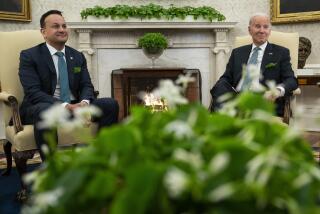Ireland is not a tax haven for Apple, ambassador says
- Share via
WASHINGTON -- Ireland’s ambassador to the U.S. declared Friday that his nation was not a tax haven for Apple Inc., formally disputing a congressional report that said company executives had negotiated a special low rate to shelter much of the firm’s foreign earnings.
“The tax rates attributed to Ireland are wrong and misleading,” the ambassador, Michael Collins, wrote to Sens. Carl Levin (D-Mich.) and John McCain (R-Ariz.) of the Senate’s Permanent Subcommittee on Investigations in a letter released Friday.
Collins said that Ireland’s 12.5% tax on corporate trading income is set in law “so there is no possibility of individual special tax rates being negotiated for companies.”
Irish officials have been pushing back against the tax-haven label since the subcommittee released a report last week that said Apple “negotiated a special corporate tax rate of less than 2%” with Ireland for three company subsidiaries located there.
Quiz: Do U.S. corporations pay too little in taxes?
In a written response to the subcommittee, Apple said that Ireland “has calculated Apple’s taxable income in such a way as to produce an effective rate in the single digits.” Since 2003, that rate has been less than 2%.
Pressed on the issue at a May 21 hearing, Apple’s head of tax operations, Phillip Bullock, said that the company had “approximately” a maximum tax rate of 2% in Ireland.
Apple Chief Executive Tim Cook also appeared to confirm that rate during the hearing. Asked if the company had negotiated a 2% rate, Cook did not say that was incorrect.
He said that as part of recruiting the company to locate there in 1980, “the Irish government did give us a tax incentive agreement.”
Because of that low rate, the subcommittee staff said Apple was able to avoid paying at least $15 billion in U.S. taxes on $44 billion in foreign income from 2009 to 2012.
Levin, the subcommittee chair, and McCain, its top Republican, said Friday they stood by their report.
“Testimony by key Apple executives, including CEO Tim Cook and head of tax operations Phillip Bullock, corroborates that Apple had a special arrangement with the Irish government that, since 2003, resulted in an effective tax rate of 2% or less,” Levin and McCain said.
“Most reasonable people would agree that negotiating special tax arrangements that allow companies to pay little or no income tax meets a common-sense definition of a tax haven,” the said.
In his letter, which was dated Wednesday, Collins disputed that Ireland is a tax haven for any company. He said the nation did not meet any of the four criteria for a tax haven set by the Organization for Economic Development and Cooperation.
Those criteria include lack of transparency.
The organization, which counts the U.S. and Ireland among its 34 members, does not list Ireland as a tax haven. But Ireland’s statutory corporate tax rate of 12.5% is the second lowest among OECD members, surpassed only by Switzerland’s 8.5%.
Britain, France and Germany have been pushing European Union members to crack down on corporate tax avoidance. Ireland, which holds the presidency of the EU for the first half of 2013, is committed to playing a leading role in making progress on tax evasion and fraud, Collins said.
ALSO:
Electric car price war shifts into high gear
Rising mortgage rates could fuel already hot housing markets
Some companies looking at retaliating against cyber attackers







